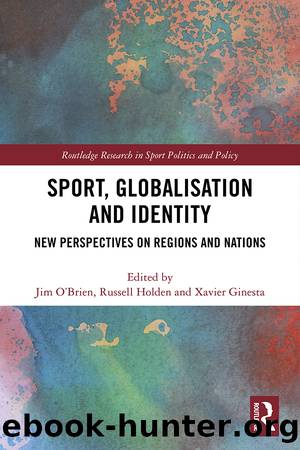Sport, Globalisation and Identity by Jim O'Brien Russell Holden Xavier Ginesta

Author:Jim O'Brien, Russell Holden, Xavier Ginesta [Jim O'Brien, Russell Holden, Xavier Ginesta]
Language: eng
Format: epub
Tags: Nonfiction, Sports, Olympics, Reference
ISBN: 9781000196337
Publisher: Taylor and Francis
Published: 2020-10-15T04:00:00+00:00
Nikolaâs responses intimately highlight the ways in which thoughts of home invoke senses of place, belonging and alienation which intimately tie to a sense of self and attachment built on experiences of family, mobility, career development and maintenance (Ahmed, 1999; Blunt and Varley, 2004; Mason, 2013).
Conclusion
In this chapter we have seen that notions of home can be both material and symbolic (Ahmed et al., 2003), existing below and stretching beyond the gaze of singular national frames of reference. In relation to maintaining a consistent home beyond the place in which they were playing, athletes with spouses and children could be seen to maintain some form of home in what they would describe as their home country. Material aspects of home are imbued with, and are located on, thresholds between memory, everyday life in the present, and future dreams, ambitions and fears (Fortier, 2000). The notion of home as where you were raised was also presented as an extremely resilient facet of both belonging and identities, though resilience is viewed as a practice of maintenance through interaction with these spaces, and social obligations related to family relationships (Goffman, 1983). The temporary nature of short-term circular mobilities was seen to be a contributory factor in the unequal allegiances between host and home countries. For those who developed and were comfortable with multiple identities, early and multiple migratory experiences enabled them to feel at home in many places.
The experiences of home and belonging of these athletes encompass the physicality of spaces, with symbolic responses pertaining to childhood developments, family and community. The experiences covered in this chapter, therefore, highlight how home and senses of belonging can pertain to both the material and the symbolic in ways which take in multiple senses of self. These perspectives provide insights on forms of belonging both below and beyond the nation, certainly stretching beyond the narrow attributed frames in popular discourse. As so-called migration crises continue to develop, it is important to uncover alternative perspectives which challenge the dominant narrative. These perspectives are a reminder of the personal, social and familial nature of migratory experiences (Carter, 2011). As populist movements across the globe use migration as an insidious vehicle for political gain, such considerations are valuable for maintaining a sense of humanity amongst the othering. Consequently, these experiences are ones we should be mindful of, not only as practitioners and researchers in sport, but as members of the communities in which opinions on migration are inculcated.
Download
This site does not store any files on its server. We only index and link to content provided by other sites. Please contact the content providers to delete copyright contents if any and email us, we'll remove relevant links or contents immediately.
Six Minutes in Berlin: Broadcast Spectacle and Rowing Gold at the Nazi Olympics by Michael J. Socolow(138)
Scientific Principles of Strength Training: With Applications to Powerlifting (Renaissance Periodization Book 3) by Dr. Mike Israetel Dr. James Hoffmann Chad Wesley Smith(134)
Jailhouse Journalism by James McGrath Morris(110)
The Telegraph Book of the Olympics by Martin Smith(92)
The Sovereign Colony by Antonio Sotomayor(90)
Tarnished Rings by Stephen Wenn(88)
Sport, Globalisation and Identity by Jim O'Brien Russell Holden Xavier Ginesta(85)
Beyond the Final Score: The Politics of Sport in Asia by Victor Cha(84)
Drug Games : The International Olympic Committee and the Politics of Doping, 1960-2008 by Thomas M. Hunt; John Hoberman(74)
Understanding International Sport Organisations: Principles, Power and Possibilities by Lincoln Allison & Alan Tomlinson(70)
The Olympic's Most Wanted™ by Floyd Conner(65)
How to Watch the Olympics: The Essential Guide to the Rules, Statistics, Heroes, and Zeroes of Every Sport by David Goldblatt & Johnny Acton(65)
Soccer Diplomacy: International Relations and Football since 1914 (Studies in Conflict, Diplomacy, and Peace) by Heather L. Dichter (editor)(60)
